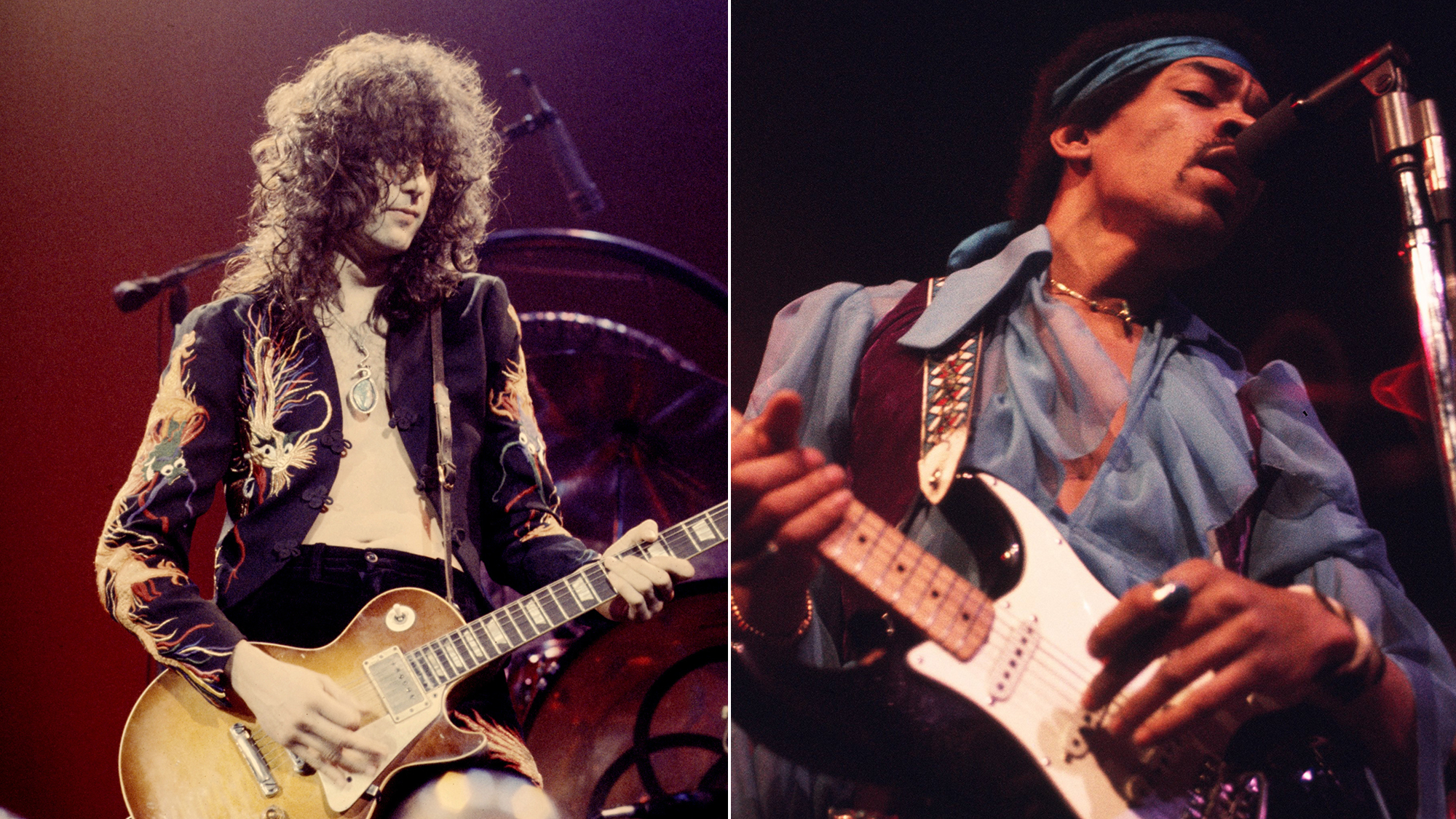“I’ve heard Jimmy Page liked my attention to detail. So do the work, kids – it pays off!” From Joe Perry to Sheryl Crow, Audley Freed has played with the greats – but nothing beats jamming with Jimmy as part of the Black Crowes
The Gov’t Mule, Joe Perry and Jakob Dylan collaborator has come a long way since starting out on a “magnetic” toy guitar
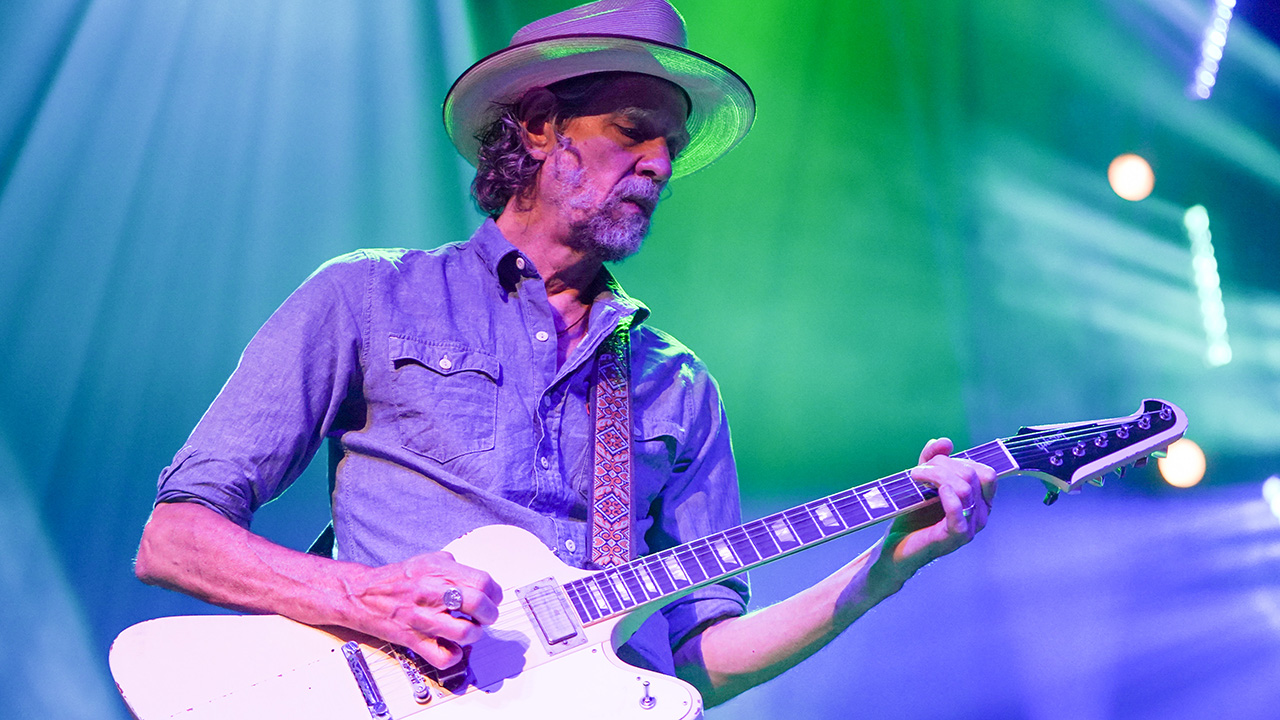
Best known as the guitarist who took over lead guitar for the Black Crowes after Marc Ford, Audley Freed has been a big part of the rock guitar world since 1993, when his band Cry of Love hit paydirt with Peace Pipe.
He found himself alongside Jimmy Page on the Crowes’ Live at the Greek in 2000, and contributed a few tracks for 2002’s Lions, which is when his four-year stint ended.
By the time they asked him to rejoin in 2005, he was too busy with duties that included Gov’t Mule, the Dixie Chicks and Aerosmith’s Joe Perry. And when he’s not gigging with Sheryl Crow, he’s busy with session work in Nashville.
“I have these collages I made from magazines when I was a teenager,” Freed tells Guitar World. “They’re hanging up in my studio. Off the top of my head I can count eight people in them I’ve made music with! These people aren’t just names I knew – their music really influenced and impacted my life. It’s been a great blessing and learning experience to play music and spend time around them.”
What initially drew you to the guitar?
“I was always drawn to it. I had a plastic cowboy-style toy guitar when I was really young. It had kind of a magnetic pull… I have no idea why.”
What sounds initially influenced you?
Get The Pick Newsletter
All the latest guitar news, interviews, lessons, reviews, deals and more, direct to your inbox!
“As a child of ‘70s radio I heard all kinds of things. You could hear soul, pop, disco, Tin Pan Alley-style crooners and all kinds of rock. I liked bits of all of it.”
Beyond that, what sorts of guitar players did you gravitate toward?
“Once I started playing, it was what you'd call FM rock – ZZ Top, Zeppelin, Aerosmith, Neil Young and The Cars, to name a very few. I was really into a lot of country rock and southern rock – the Allmans, Skynyrd, Ozark Mountain Daredevils and Marshall Tucker. The soundtrack to the film Dazed and Confused pretty much sums it up!
“I liked a lot of music that wasn’t necessarily about the guitar, including soul and yacht rock. I got into all kinds of styles and eras as I went along. I’m still discovering a lot of music.”
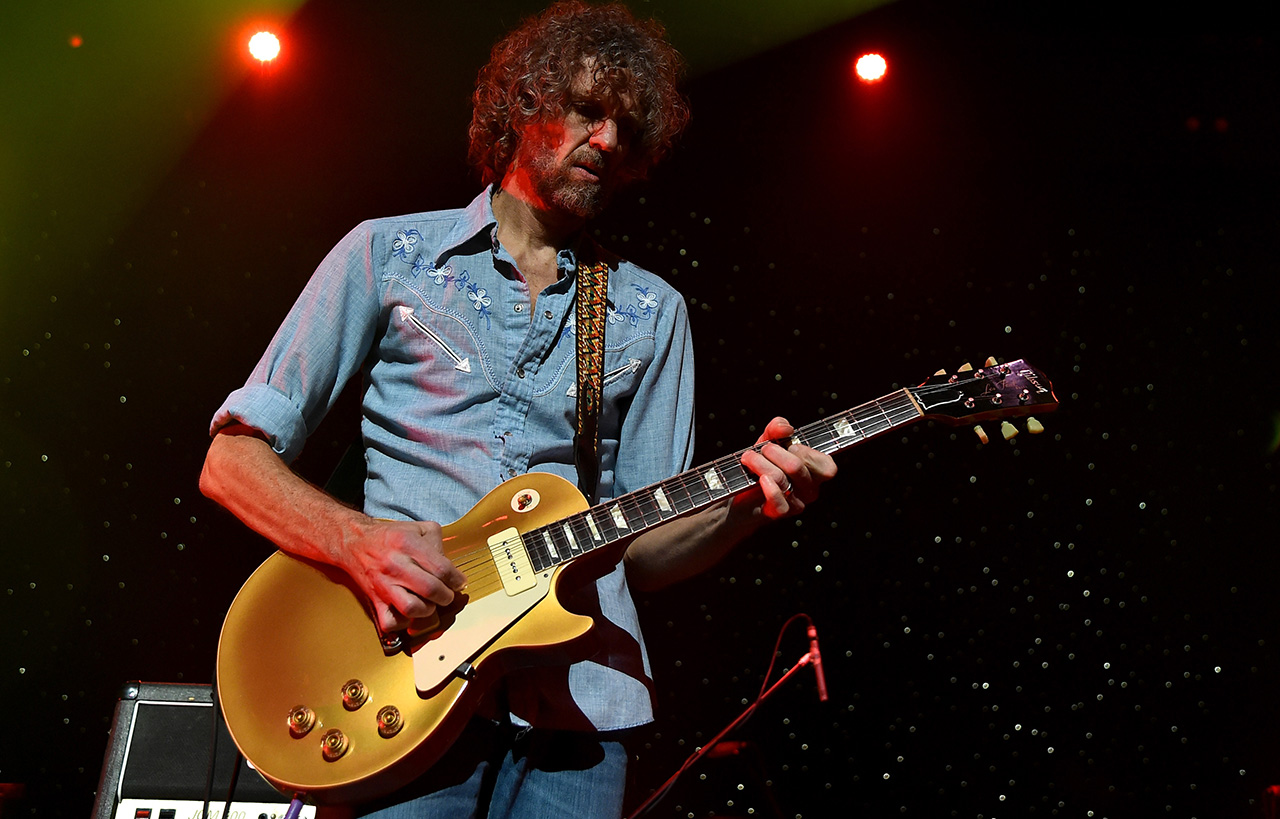
What was your first setup like?
“My first amp was called a Marlboro. I think it had a single 12-inch speaker and was most certainly solid-state. I couldn't get it to sound anything like the stuff I was listening to!”
What was the local scene like as a young player?
“I’m from a small town in southeastern North Carolina called Burgaw. It was really rural, with about 2,000 people. Now it’s the home of Mojotone, one of the world’s leading suppliers of all kinds of guitar gear. If you had told me that back then, it would have seemed impossible… We got our first stoplight when I was 15!”
How did that impact your development?
“I could pick up three FM rock stations, and occasionally music magazines would be at the convenience store. There were record stores in Wilmington, about 25 miles away. I guess all that, along with the occasional appearance of bands on TV, was how we got our information.
“There were a few people in town who were really into rock ’n’ roll and turned me on to things. They played too. We’d get together and jam for fun; and once in a while we’d play a dance or street festival. I don’t believe there ever was a bass player.
“My friend and early mentor, Ernie Johnson, lived in the next county. He was the best guy around – and he had a real Gibson Les Paul! He showed me a lot. When I went to college in Wilmington, I started playing with and hanging around a lot of the local musicians. There was a club called The Mad Monk where regional and national bands would play. That was the first scene I was a part of.”
When did you realize the guitar would be a lifelong thing?
“I never had a moment where I came to that conclusion. However, it was never a question – I would always play the guitar, even if it wasn’t for a living.”
What about your first proper rig?
“I had a ’77 or ’78 Marshall JMP combo that my parents bought for me in high school. I used it in bands while I was in college and in a full-time cover band after I graduated. I sold it to a friend years ago, but he was kind enough to sell it back to me not too long ago.”
Was Cry of Love your first real band?
“I’d played in cover bands for a few years, but yeah, I’d say Cry of Love was my first proper band. We put it together after a few years of playing the six-night-a-week, four-set-a-night cover circuit that existed at the time, mostly around the southeast.
“We parked ourselves in Raleigh, NA, got jobs, found a practice space, and went to work. We practiced several nights a week, wrote songs, and did a bunch of demos at a local studio with John Custer, who eventually produced our albums.
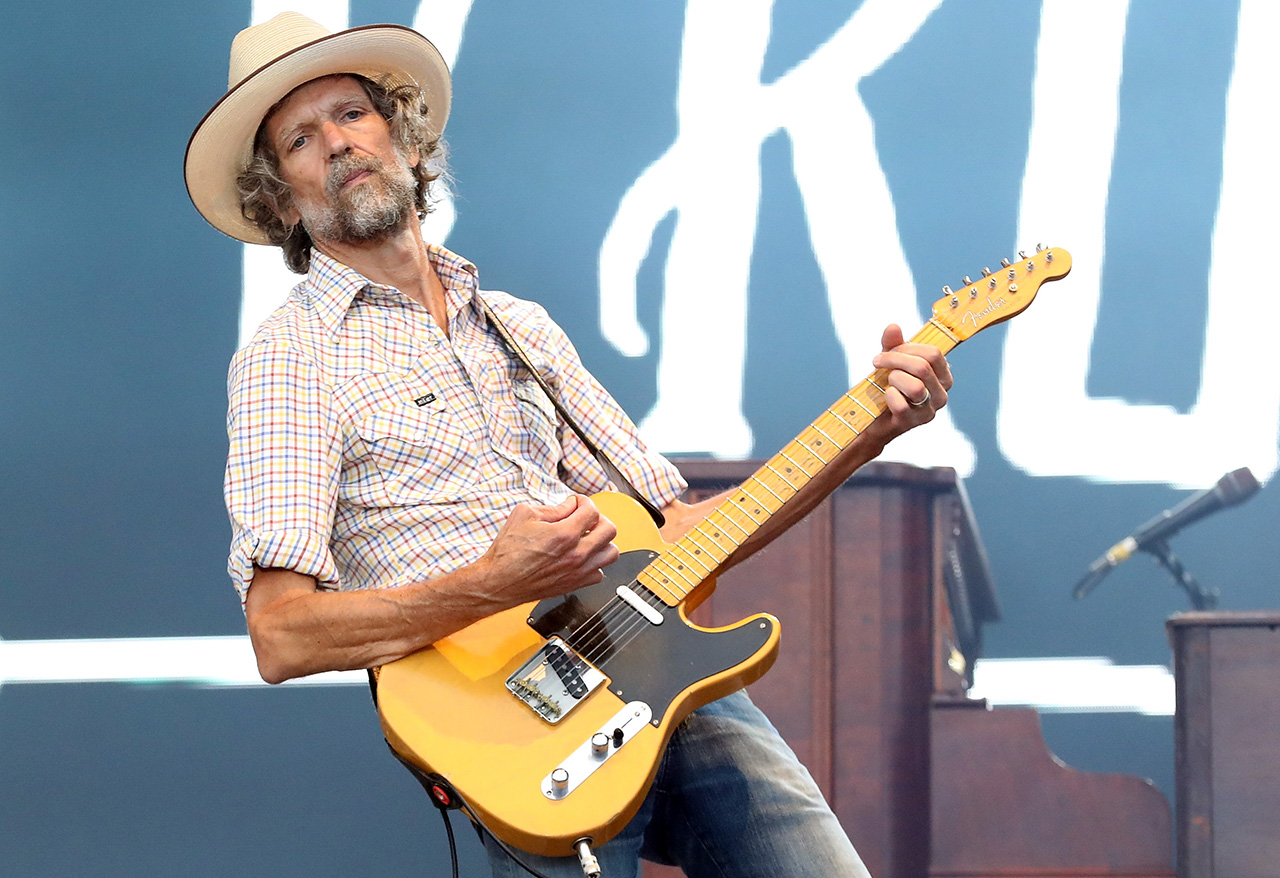
“It took a few years, but our deal came about when a guy at Columbia named Josh Sarubin heard an unfinished demo and came to see the band. That was kind of the way you went about it back then, pre-internet.
“It was a great time. We set up in Muscle Shoals Sound and played live, just like we did at band practice and our gigs. We were a pretty tight unit, so getting the basic tracks went quickly. We wanted to capture the live sound plus some minimal sweetening – and that’s what we did.”
That debut album, Brother, featured two top-10 hits, one being Peace Pipe. How did that song come together?
I went for a cleaner tone than Rich Robinson to try to complement his sound. I was thinking of a Malcolm and Angus Young approach
“I worked at a place called Harry’s Guitar Shop – it’s still there in Raleigh. I was unpacking a guitar and I just played something on it that became the main riff in Peace Pipe. The lick just came out of nowhere. That was a Friday. We had a band practice Sunday night, and by the end, it was pretty much done.”
Can you remember the gear you used while recording it?
“The gear on the record was a ’73 non-master volume Marshall and a Warmoth Strat-style guitar. I believe I doubled it with a ‘50s Les Paul Junior through a Silverface Fender, which I think was a Vibrolux. I found out recently that Fender amp was used on a lot of hits at Muscle Shoals Sound; it’s still in the studio there.”
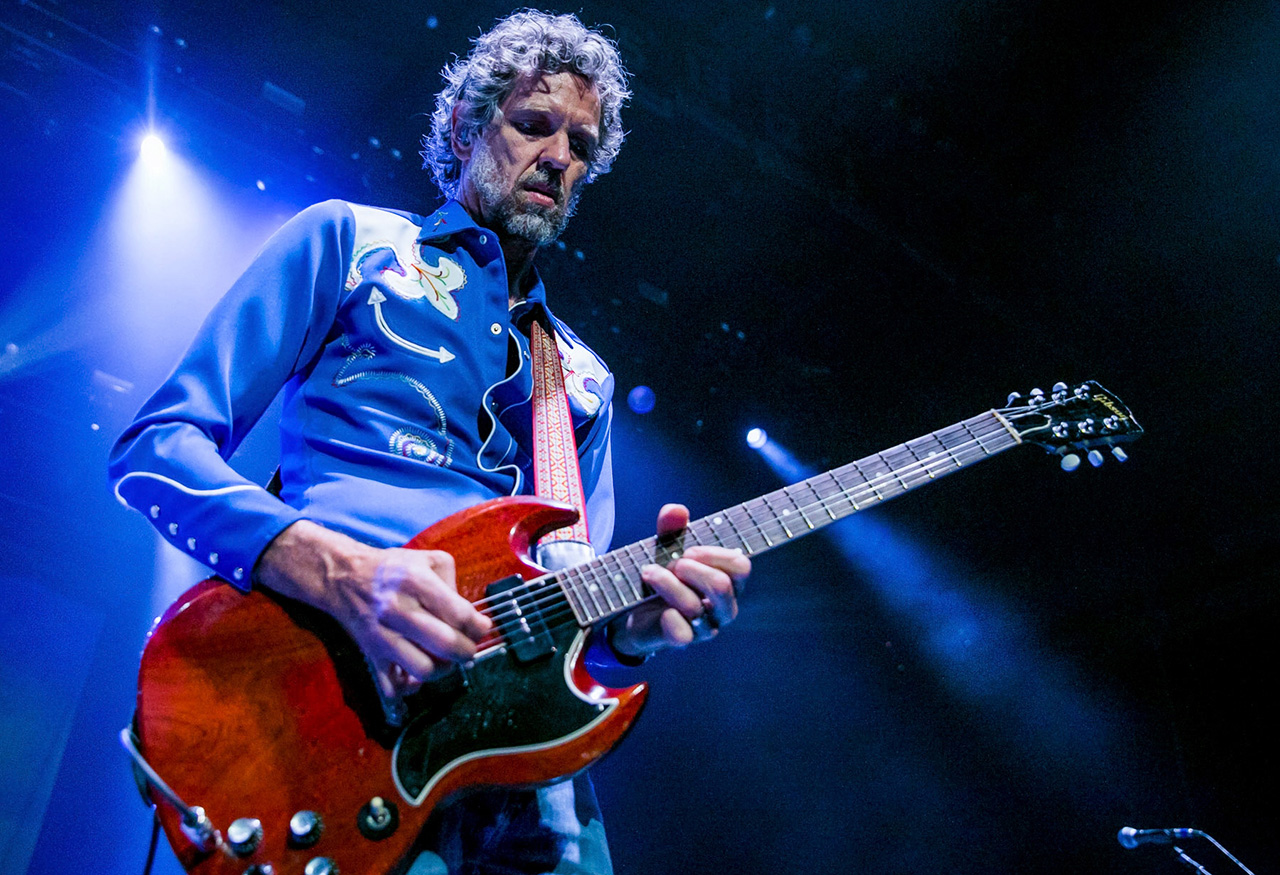
What led to the Black Crowes calling you in 1998 after Marc Ford left the band?
“I was recommended by several folks. I did an audition in Atlanta in the fall of ’97. That was a Friday. I got a call back on Monday, so I knew it went well – but then nothing happened for months. They didn’t do any touring until June of ’98. I went to Atlanta then to rehearse and went on tour.
“There was no directive, really. I knew the songs and played the essential parts with my approach. When it was time to do my own thing, I did that too. They seemed happy with that.
“At the time, I was using a Bogner Ecstasy on the clean channel cranked way up. I went for a cleaner tone than Rich Robinson to try to complement his sound. I was thinking of a Malcolm and Angus Young approach – not necessarily musically, but sound-wise. Sometimes when two guys are both playing with a lot of gain, it can make things sound smaller. It was loud!”
The subsequent tour found you at the Greek with Jimmy Page.
“I could talk for days about that experience. To be in the same room, much less playing with a guy who was such a big influence – and such a cultural icon – was mind-blowing. Like any real rock player in the ’70s, I had a poster of him on my bedroom wall. He was very kind and gracious.”
Did you grab any wisdom from him?
“I believe he appreciated the respect we gave to the tunes. I’ve heard from mutual friends that he liked my attention to detail. So do the work, kids – it pays off! I saw him recently for the first time since then. I was playing at the Rock and Roll Hall of Fame induction ceremony with Sheryl Crow, and he was there. It was great to be able to say hello.”
I helped Joe Perry get a band together… Quite an experience to be grilling steaks with another hero who was on my bedroom wall!
What type of rig did you use at the Greek that night?
“I think I was using a ’74 Marshall non-master 50-watt head, combined with a Fender Tonemaster, into two halves of a Matchless 4x12 cabinet. I can’t be sure… I’ll have to look at some YouTube videos!”
What was the process of recording Lions like?
“I was only there for a couple of days and I played on two or three tunes. However, I met Don Was, who was producing, for the first time there. I’ve done a lot of work with him since.”
Were you asked to rejoin the Crowes when they fired back up in 2005?
“I was asked, but I declined.”
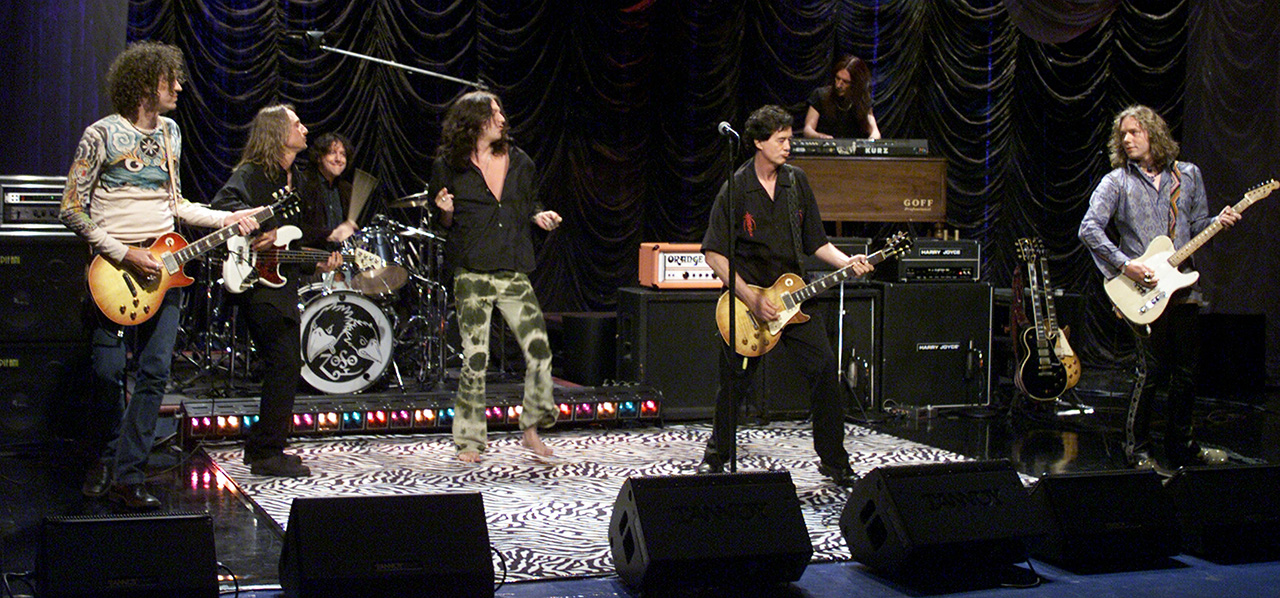
Post-Crowes, you were on Govt Mule’s The Deep End Vol. 1 with Larry Graham. How did that come to be?
“Warren Haynes was writing for the project and asked me if I had any tunes. I gave him a demo of the track, and he wrote some lyrics. It was cool because the feel of the demo was based on I Wanna Take You Higher by Sly and the Family Stone, which Larry Graham played on.
“There was also a bass lick in the intro patterned after something he played on a Graham Central Station tune. Lo and behold, here we are in NYC recording the track, and Larry Graham is playing the part. Crazy!”
You’ve worked with Chris Robinson and Jakob Dylan in the years since. How did you approach those very different gigs?
“I approach any gig by trying to be as appropriate and respectful of the music as possible. Chris’ gig was pretty freewheeling, jammy and loud – a lotta fun. Jakob’s was way more understated but with room for interpretation; really fun in a different way.”
You also ended up joining Joe Perry’s solo band for a short spell. What was it like working with him?
“I helped him get a band together for a few shows and some TV around the release of one of his solo records. It was great fun. Quite an experience to be grilling steaks and playing with another hero who was on my bedroom wall!”
You’re playing with Sheryl Crow now. How did you get the gig?
“Her guitar player, Peter Stroud, is an old buddy of mine. She was putting a new band together for her and brought me in. All the new band members had played together in various situations. The bass player, Robert Kearns, was a founding member of Cry of Love.”
Do you have a favorite song of hers to play?
“Truthfully, I enjoy playing everything in her catalog – to name a few: There Goes the Neighborhood, I Shall Believe, Cross Creek Road, and Steve McQueen are some favorites; they’re fun to interpret.”
I’m always keeping busy… I’m playing on a couple of different rock records right now
What’s your current rig like?
“I use all kinds of stuff. I’m a fan of most Vox AC30-style amps. I have a couple, including a ’64, that I use a lot in the studio and for remote tracking at home. I’ve also been using an early ‘70s Selmer a lot for recording. Other amps I use a lot are a Lazy J 20, Badcat Black Cat, Germino 50-watt, Blackface Showman and Deluxe, and a PRS 30-watt.
“I use a lot of P-90 and Tele-style guitars. Right now, my live touring amp for Sheryl Crow shows is a 15-watt Matchless Lightning and a single 12 Reeves cabinet, but I’ll change it up from time to time. I also use a Fender Vibrolux reissue when I want to switch to that type of clean tone. For other gigs I’ll tailor the amp to the situation, volume and tone-wise.”
Sheryl aside, what’s next for you in all lanes?
“I’m always keeping busy… I’m playing on a couple of different rock records right now. I do a fair amount of that, and sessions for what I guess is called Americana these days. And I’ll be out this summer doing shows with Sheryl Crow.”
- Freed heads out on the road with Crow starting on July 25 in Seattle.
Andrew Daly is an iced-coffee-addicted, oddball Telecaster-playing, alfredo pasta-loving journalist from Long Island, NY, who, in addition to being a contributing writer for Guitar World, scribes for Bass Player, Guitar Player, Guitarist, and MusicRadar. Andrew has interviewed favorites like Ace Frehley, Johnny Marr, Vito Bratta, Bruce Kulick, Joe Perry, Brad Whitford, Tom Morello, Rich Robinson, and Paul Stanley, while his all-time favorite (rhythm player), Keith Richards, continues to elude him.
“It was tour, tour, tour. I had this moment where I was like, ‘What do I even want out of music?’”: Yvette Young’s fretboard wizardry was a wake-up call for modern guitar playing – but with her latest pivot, she’s making music to help emo kids go to sleep
“One of the guys said, ‘Joni, there’s this weird bass player in Florida, you’d probably like him’”: How Joni Mitchell formed an unlikely partnership with Jaco Pastorius










![John Mayer and Bob Weir [left] of Dead & Company photographed against a grey background. Mayer wears a blue overshirt and has his signature Silver Sky on his shoulder. Weir wears grey and a bolo tie.](https://cdn.mos.cms.futurecdn.net/C6niSAybzVCHoYcpJ8ZZgE.jpg)

![A black-and-white action shot of Sergeant Thunderhoof perform live: [from left] Mark Sayer, Dan Flitcroft, Jim Camp and Josh Gallop](https://cdn.mos.cms.futurecdn.net/am3UhJbsxAE239XRRZ8zC8.jpg)
